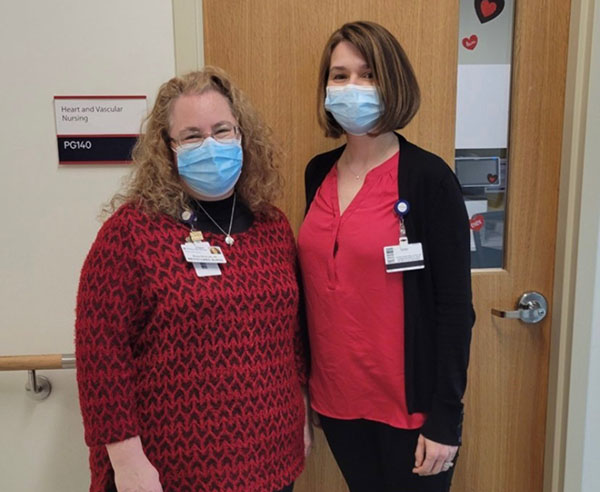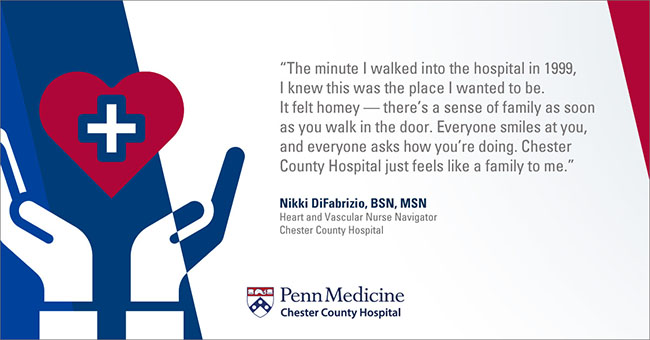 What do you want to be when you grow up?
What do you want to be when you grow up?
This common question is one we ask children all the time. Some might reply “Princess” or “Rock Star” and change their minds often. But for Nikki DiFabrizio, MSN, RN, PCCN, she knew in elementary school that she wanted to be a nurse. As she got older, her passion for nursing remained, but it was during high school that she realized her heart was in cardiology.
"I knew heart disease was in our family," Nikki explains, "and when I was a senior in high school, my dad had a heart attack. He actually missed my high school graduation because he was in the hospital."
She describes this experience in her life as a "lightbulb moment".
"I could see how the nurses were supporting him through this event and making heart disease survivable," Nikki says. And that was something she wanted to do, too.
Nikki has worked at Chester County Hospital for over 20 years, pursuing her passion for cardiology and helping others. And when she became a heart and vascular nurse navigator in 2019, she felt as though she had finally found her dream job.

What Is a Nurse Navigator?
Prior to becoming a nurse navigator, Nikki had worked many jobs at Chester County Hospital.
Her role as a nurse navigator builds on all of the knowledge she acquired as a nurse in telemetry, Step Down, and the Post-Interventional Unit (PINU) -- as a supervisor of the night shift and as a COVID-watch nurse.
Nikki has done it all, but her position as a nurse navigator allows her to use her knowledge in a slightly different way.
A heart and vascular nurse navigator is someone who is there to support patients through different heart concerns — like a heart attack or chest pain. In the hospital and in a patient’s heart health journey, nurse navigators are the people who check up on patients — even after they leave the hospital.
"When I was a bedside nurse, it was very rewarding to save lives. But the patients leave the hospital, and then it's a longer-term process to stay healthy," Nikki says. "When you're in the hospital, someone is bringing you your medicine and your meals and is changing your linens — and there’s no laundry! It’s a lot harder for patients to navigate in real life when they’re not in the hospital."
In her role as a heart and vascular nurse navigator, Nikki helps patients take the right next steps to support their recovery following a heart event or in pursuing a heart-healthier lifestyle.
A nurse navigator can connect patients with information and education, but also with cardiac support groups, cardiac rehabilitation, and financial counseling. It's not only about follow-up, but follow-through.
"For me, it's very rewarding to hear how grateful patients are to have that follow-up," Nikki says. "We’re still reaching out to them, and they can call us a year later and we're still there to help them."
The Bridge Between Patients, Physicians and Pharmacists
As a nurse navigator, Nikki doesn’t really have a typical day. She describes each day as a "box of chocolates" — like in the movie Forrest Gump — you never know what you're going to get.
In her role, she is taking incoming calls as well as making discharge calls for every single cardiac patient — that means anyone who has had a heart attack or a stent put in. Sometimes she's calling pharmacies to ensure prescriptions get filled, or she's helping patients understand their next steps after a heart attack — like what medicines they need to be taking and how to make getting them easier.

Nikki describes her job as being an advocate, a translator, and also as a bridge.
As a translator, she helps make complex medical terms easy to understand for patients. As an advocate, she's there to ensure each patients' care is continuous — and that they're getting the physical, emotional and social support they need for a successful recovery. And like a bridge, Nikki and the nurse navigators are there to connect patients, providers and pharmacies.
“For example,” Nikki explains, “after a patient gets a stent, they are required to take an antiplatelet medication for one year following their procedure." This medication is crucial to prevent the stent from closing — and to prevent a future heart attack.
"We had a patient who understood he needed to get this medication filled; but he went to the pharmacy, and they did not have it," Nikki continues. "[The pharmacy] ordered it for him, but it did not come in for 4 days. He ended up not getting his medicine filled, and he had another attack."
Collaboration among the Heart and Vascular Team identified a disconnect between the patient, the pharmacy and the prescription. It is now a part of their procedure to make sure patients have this medication in their hand from the outpatient pharmacy before being discharged. Part of the role of the nurse navigator is being that middle-person between the many different pieces of the healthcare puzzle — taking problems and finding solutions.
It's Never a Bad Time to Focus on Heart Health
Whether you have just been diagnosed with heart disease, had a recent heart attack, or want to live a more heart-healthy life, the heart and vascular nurse navigators are here to help.
When it comes to individuals who have come to the hospital for a heart-related event, they can expect a call from a nurse navigator following their discharge. But you can also reach out to a nurse navigator online with heart-related questions or concerns.
"It is scary to think you might have something wrong with your heart, but the exciting thing is that there are so many ways and technologies to treat those types of concerns," Nikki says. "Heart disease is something you can live with. And we love hearts in the nurse navigator office, so call us any time."
For More Information about living a heart-healthy lifestyle, Reach Out to a Chester County Hospital Heart And Vascular Nurse Navigator today!